Bird cherry berries: benefits and harms, recommendations for use
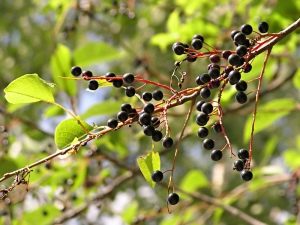
Bird cherry is a beautiful plant that is associated with the Russian people. It is valued for its decorative species, especially during the flowering period, it is planted in gardens to be enriched with vitamin and mineral composition not only in summer, but also in winter, it is harvested to give culinary dishes an exquisite taste. But bird cherry is valued in Russia due to its wide spectrum of action in medicine, thanks to its rich composition, folk healers cured people of various ailments.
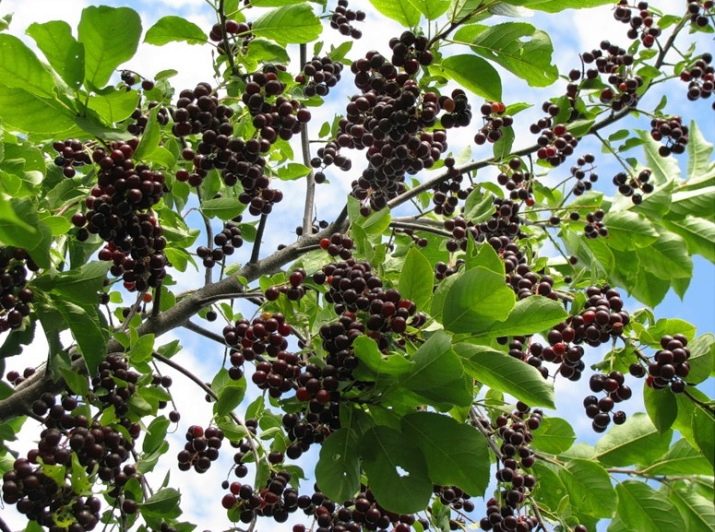
plant description
Bird cherry is a deciduous shrub that is very similar to a tree, as it reaches a height of up to 10 meters. There are several types:
- ordinary;
- late;
- maaka;
- Pennsylvanian;
- virginian;
- antipka.
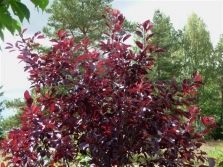
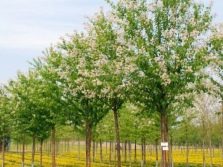
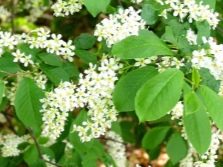
By ear, everyone knows only the common species and the late bird cherry. In fact, on the territory of Russia, Ukraine, Belarus and Moldova, as well as in Asia, each of the listed types of bird cherry can be found. They differ from each other only in the shape and color of the inflorescences, as well as in the size of the fruits.
There is some conflicting evidence as to which genus this plant belongs to. Some sources claim that bird cherry belongs to the genus of plums, others say that it is a kind of cherry and at the same time - of the Rosaceae shrub family.
One way or another, this shrub prefers mineral-rich, moist soil, next to which groundwater occurs, which is why it can often be found near rivers. The trunks of the plant are thin, covered with a matte grayish bark. The leaves are elliptical in shape, pointed at the end, with short petioles, bright green in color.
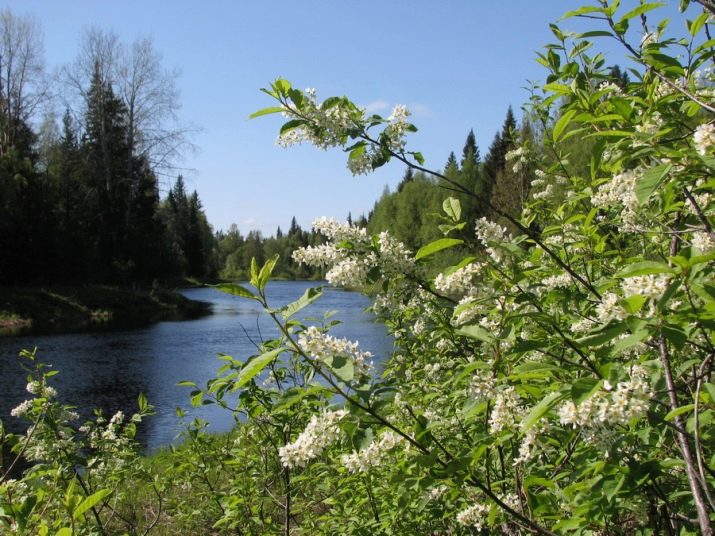
The flowers are small, collected in an oblong brush. Most often you can find white inflorescences, but there are also pink ones. The smell of bird cherry during flowering is strong, fragrant. The tree blooms in late May and early June.
Bird cherry fruits are rounded, black in color. In the middle is a large, round bone. The taste of the berry is sweet and slightly astringent. Deep purple flesh.
The fruits ripen in late July or early August. As a raw material in various industries, not only berries are used, but also the bark, leaves and roots of bird cherry.
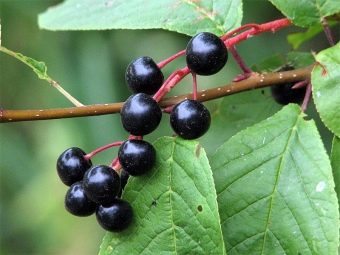
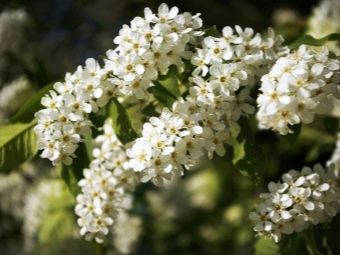
Useful properties of fruits
Bird cherry berries are very small in size, but they are called a storehouse of vitamins and minerals. They include the following components:
- tannins up to 15%;
- hydrocyanic acid up to 0.1%;
- organic acids: citric and malic;
- vitamins: rutin, ascorbic acid;
- Sahara;
- anthocyanins;
- essential oil;
- flavonoids;
- fixed oils;
- benzoic aldehyde;
- phytoncides;
- glycosides - prunazine, amygdalin, prulaurazine.
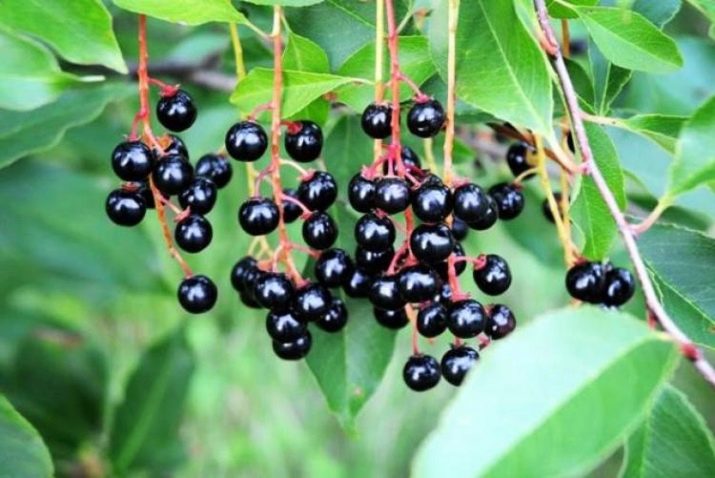
Beneficial features:
- bactericidal action is characterized by the presence in the fruits of a large amount of citric and malic acid, as well as phytoncides;
- fungicidal and insecticidal properties are formed due to ascorbic acid;
- astringent action is provided by tannins;
- anti-inflammatory effect occurs due to anthocyanins, organic acids and essential oils;
- diaphoretic and diuretic action is provided by flavonoids and glycosides;
- general strengthening property forms a combination of vitamin composition and phytoncides;
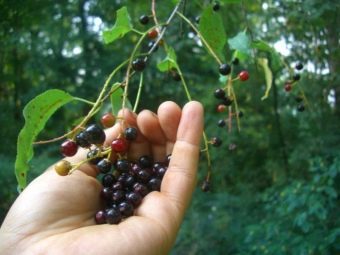
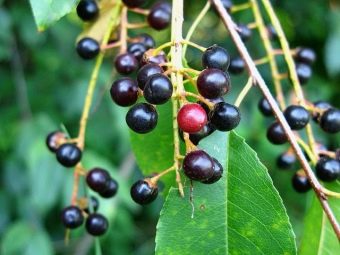
- disinfecting effect due to hydrocyanic acid;
- the regenerative effect is due to the presence of rutin, fatty and essential oils in the fruits;
- anthocyanins, benzoic aldehyde have an analgesic effect;
- vitamins, phytoncides and minerals provide an immunostimulating property.
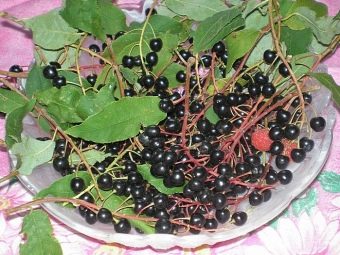

Due to such a large number of different substances, bird cherry is used to treat the following diseases:
- disorders of the gastrointestinal tract - non-infectious nature of diarrhea, impaired gastrointestinal motility, increased or decreased secretory activity of the stomach, inflammatory diseases;
- skin diseases: furunculosis, dermatitis, psoriasis;
- ophthalmic diseases: purulent-inflammatory processes of the eyelids, burns;
- in gynecology used as a contraceptive;
- joint diseases: rheumatism, gout, sciatica;
- diseases of the upper and lower respiratory tract: rhinitis, tuberculosis, bronchitis;
- inflammatory processes in the oral cavity: stomatitis, toothache.


In addition, bird cherry has a very powerful phytoncidal effect, its particles spreading through the air can improve the atmosphere, as well as destroy small insects - midges, flies, mosquitoes.
Contraindications
This plant, rich in useful properties, was used in folk medicine many centuries ago, not suspecting that in addition to benefits, bird cherry can also cause harm. As mentioned above, it contains hydrocyanic acid - this substance in large quantities and concentrations is a deadly poison.Therefore, it is forbidden to consume bird cherry berries in large quantities, and even more so without seeds, since there is the most poison there.
An important contraindication is the increased sensitivity of the body to the components of bird cherry.
A high content of tannins both in the pulp and in the bones, bark and leaves can provoke stool retention, that is why it is not recommended to use raw bird cherry in the diet for people who suffer from chronic constipation.

A high concentration of phytoncides, especially in a flowering tree, worsens the general well-being, especially of the elderly. As a result, it is not recommended to enjoy blooming, fragrant bird cherry for a long time if you suffer from migraines, increased susceptibility to odors, and also if you have anemia.
Pregnancy and lactation are relative contraindications, since moderate consumption of bird cherry fruits will not harm the expectant and nursing mother, as well as her baby.
Children under 3 years old are not recommended to use bird cherry, since a high concentration of substances can cause an allergic reaction or adversely affect the child's gastrointestinal tract.
For people who suffer from diabetes, the use of this berry is also contraindicated due to the high content of sugars in fruits. If you are on a diet, then you should not introduce bird cherry into the diet, as it is a high-calorie product.


Application features
Since ancient times, healers, using folk medicine, found an individual approach to each patient from the old man to the baby. And also studied each plant in such detail that there were features of the use of each part of the medicinal raw material.Today, almost all of this old knowledge has been improved, and the dosage is calculated for each baby and adult, depending on the age and characteristics of the diseases. For the use of bird cherry fruits, there are some features of the reception.
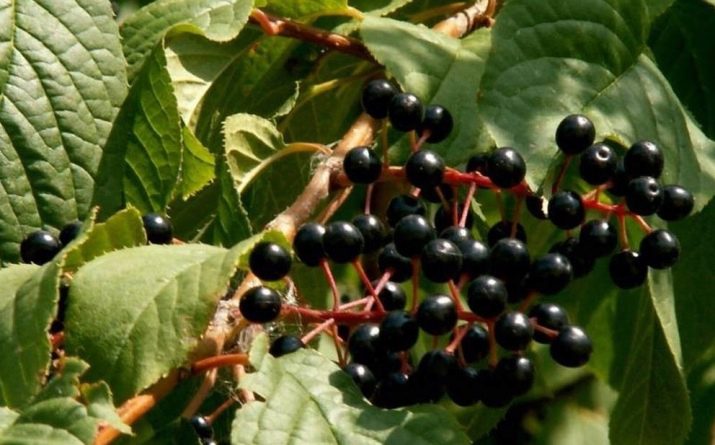
Adults
The safest use of bird cherry is practiced by healthy adults who consume berries in their diet as a preventive measure. A healthy person can eat 250-300 grams of ripe fruits per day, so the body will be enriched with the necessary components, and the product will not harm health.
People who suffer from any pathology usually use pharmacy or homemade raw materials from bird cherry parts. If you purchased a bird cherry preparation at a pharmacy, then be sure to follow the instructions. Many medicinal drinks are made from it in the form of tincture, decoction, compote, tea, infusion, fruit drink. To do this, use edible ripe berries, both fresh and dried, leaves and bark.
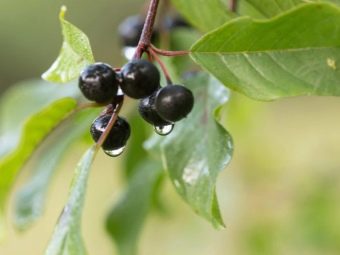
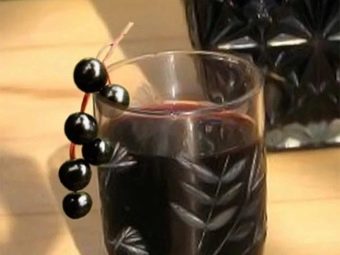
Recipes:
- From diarrhea. Take 1 tablespoon of dried fruit and pour 1 cup of boiling water over it. Let the medicine brew for 30 minutes, and then drink 50 ml during the day 4-6 times.
- headache remedy. It is necessary to pour 3 tablespoons of bark into 0.5 liters of boiling water, then put a container on a slow fire and cook until it boils. Cool the broth, strain. You need to take 3 sips 3 times a day before meals.
- To improve immunity. Cherry berries 300 grams pour 0.5 liters of vodka. Put in a dark place, let the medicine brew for about 20 days. Then strain the drink, and use 1 tablespoon after meals during viral epidemics.
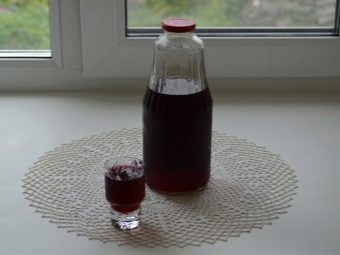
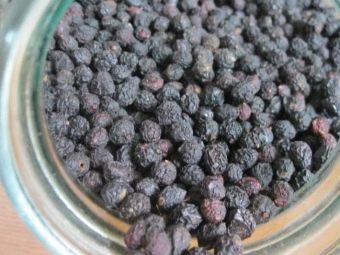
children
The use of bird cherry for children is somewhat limited. For example, children under 3 years of age are strictly forbidden to use this delicacy.Older people can use 150-200 mg per day. Delicious compotes, decoctions, juices are made as prevention and treatment of childhood diseases.
Mostly for therapeutic purposes, bird cherry is used for diarrhea, children drink a delicious drink with pleasure, after which they soon get rid of an unpleasant ailment.
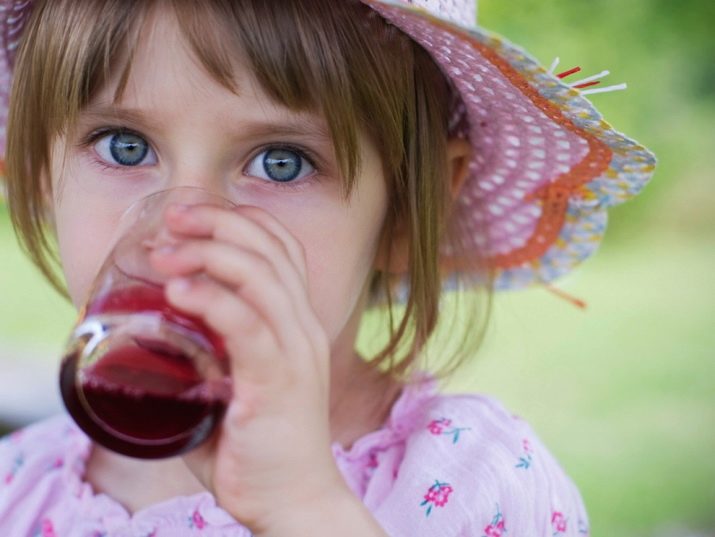
Recipes:
- Compote for the prevention of colds. For 1 liter of water, you will need 0.5 kg of bird cherry fruits and 300 g of granulated sugar or honey. Mix all the ingredients, put on a small fire, cook the compote for 45 minutes. Cool the drink, after which you can give your child 1 glass 2 times a day, preferably during or after meals.
- Cherry juice. For juice, you will need 5 kg of frozen bird cherry, which you will need to fill with boiled water and put on a slow fire. You need to cook until it boils so that the berries release as much liquid as possible. The drink turns out to be very concentrated, so it is best for children to add 1 tablespoon to mineral water or tea.
You can use another method, but it will take more of your time. You need to remove the seeds from the berries, then pass the pulp through a juicer, dilute it a little with water and bring the drink to a boil. When the drink is ready, you can use it, following the above instructions for taking.
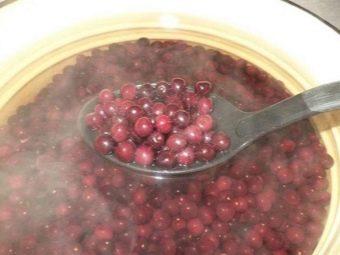
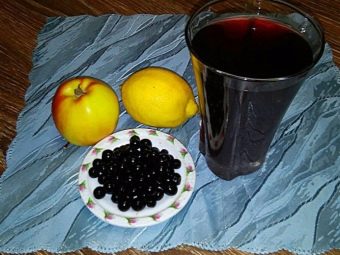
During pregnancy and breastfeeding
Some sources talk about a strict ban on taking bird cherry during pregnancy. But there is evidence that pregnancy and breastfeeding are a relative contraindication. In these conditions, it is best to consult a gynecologist and pediatrician.
In any case, bird cherry should be taken in small dosages. It is best to use fresh berries or compote in small quantities.When breastfeeding, you need to introduce bird cherry into your diet at 3 months gradually, it is by that time that the baby most of all needs auxiliary components that he receives with milk for better growth.

Helpful Hints
It is important to remember that before using bird cherry fruits, you need to follow the following rules:
- eat fresh only ripe berries;
- it is strictly forbidden to eat the whole fruit, the bone must be thrown away;
- do not abuse a lot of berries;
- for the prevention and treatment of bird cherry, consult a doctor so that he selects an individual dosage for you;
- if you plan to independently prepare raw materials for the winter, use only whole and fresh fruits, leaves, bark, follow proven canning or drying technologies, store in a dark, dry place;
- when using raw materials for medicinal purposes, follow the required concentration of the drug and the proportions for home-made.
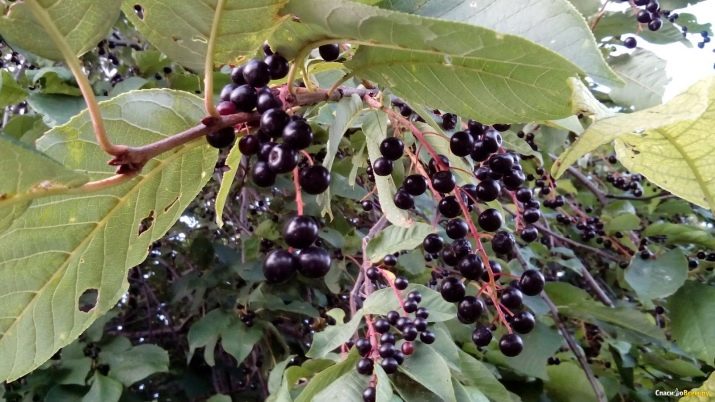
See the following video for more on the benefits of bird cherry berries.

















